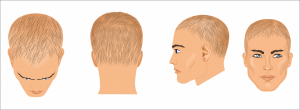Telogen Effluvium
 Everyone has stress in their everyday lives. Unfortunately, sudden stress can lead to hair loss as well as a thinning condition known as Telogen Effluvium.
Everyone has stress in their everyday lives. Unfortunately, sudden stress can lead to hair loss as well as a thinning condition known as Telogen Effluvium.
Telogen is when the hair growth cycle is in its resting stage. Telogen Effluvium happens when stress forces a large number of hair roots to move prematurely into the resting stage. The hair will usually return given enough time but it has been known to be irreversible in some cases like in people who are prone to male or female patterned baldness.
A variety of causes can lead to this condition. A few of them include childbirth, severe illness and high fevers, thyroid problems, major psychological stress and even some medications (such as beta blockers and antidepressants).
The sudden diffuse hair loss normally doesn’t become apparent for anywhere to 2-3 weeks to 2-3 months after the start of the Telogen Effluvim hair loss process. The hair loss occurs on the scalp as evidenced by thinning of the scalp hair. A significant amount of hair shedding can also happen during hair care procedures such as shampooing and combing of the hair.
There are some patients who suffer from Chronic Telogen Effluvium (a condition normally found in women who had very thick hair earlier in life). This condition is not as obvious to the casual observer as the patient continues to have thick hair. The degree of shedding can be severe but not as obvious due to the thickness of the hair.
Once the cause of the shedding (stress producing event) is no longer present or active, the shedding pattern normally slows down, or disappears completely, after 6-8 months.
In most cases, treatment is not necessary for Telogen Effluvium. The hairs, shed by those with the condition, are pushed out by new hair growing beneath them. The hair falling out signals that regrowth has begun for the patient. Unless your doctor has a reason to think the condition is being caused by medication or some genetic deficiency, Telogen Effluvium is usually self-contained and requires no further treatment.